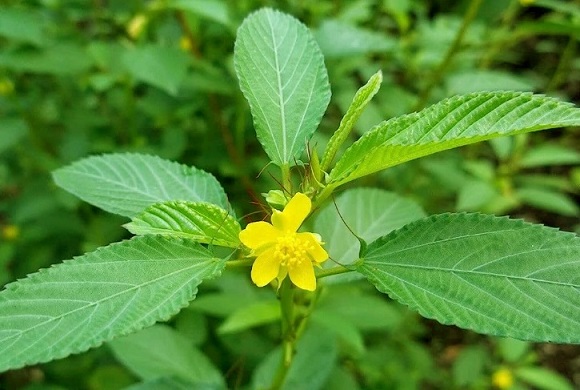Nikhil Prasad Fact checked by:Thailand Medical News Team Apr 12, 2025 16 hours, 25 minutes ago
Medical News: In a groundbreaking new study, researchers from Egypt have discovered that the roots of Corchorus olitorius—commonly known as molokheia—contain powerful anticancer properties, especially when transformed into nanocrystals. While the leafy parts of this plant have been widely used in traditional cuisine and medicine, the roots have long been overlooked. Now, for the first time, scientists have revealed that these neglected plant parts might be key to developing novel herbal-based therapies for breast, liver and colon cancers.
 New Study Shows That Molokheia Root Extract Can Kill Cancer Cells
New Study Shows That Molokheia Root Extract Can Kill Cancer Cells
The research was conducted by a team of scientists from the Faculty of Pharmacy at Minia University (Marwa A.M. Abdel-Razek, Miada F. Abdelwahab, Ashraf N.E. Hamed), and Deraya University (Soad A. Mohamad, Hesham A. Abou-Zied, Usama Ramadan Abdelmohsen), Egypt. This
Medical News report explores their comprehensive lab-based and computer-simulated investigations into how the molokheia root extract, especially in its nanocrystal form, attacks and kills cancer cells.
From Kitchen to Cancer Clinic
Molokheia, a common vegetable in Middle Eastern cuisine, belongs to the Tiliaceae family. While the leaves are packed with antioxidants and anti-inflammatory compounds, the roots have remained largely unstudied. That changed when researchers created a total methanol extract from the plant’s roots (TMECOR) and tested it against three human cancer cell lines: MCF-7 (breast), HepG2 (liver), and Caco-2 (colon).
The extract showed strong inhibitory effects across all three types. The most potent action was against colon cancer cells, where it achieved an IC50 value of just 18.63 µg/mL. Even more promising was the performance of nanocrystals made from the extract—tiny particles measuring just 370 nanometers. These nanocrystals were far more effective, particularly against liver and colon cancers, with IC50 values of 23.29 µg/mL and 12.15 µg/mL respectively. For comparison, standard chemotherapy drug staurosporine had lower IC50 values, but the plant extract's performance was still impressive, considering its natural origin.
Uncovering the Bioactive Ingredients
To understand what exactly makes the extract so powerful, the scientists performed a detailed metabolomic analysis using advanced liquid chromatography and mass spectrometry (HPLC-HESI-HRMS). They identified 15 different active compounds, most of which were phenolic acids and flavonoids—well-known classes of molecules that can interfere with cancer cell growth. Key compounds included chlorogenic acid, caffeic acid, rosmarinic acid, rutin, apigenin, and kaempferol. All of these have been previously reported in scientific literature for their anticancer, antioxidant and anti-inflammatory properties.
Cracking the Code with Computers
The researchers didn’t stop at lab tests. They used powerful computational models to analyze how the compounds interact with human cancer genes a
nd proteins. By tapping into global gene databases like NCBI-GEO and PharmGKB, they mapped out cancer-related genes that could be targeted by the extract. Using the STITCH database and Cytoscape software, they built a network of protein-protein interactions and identified critical "hub genes" such as EGFR, BRAF, ESR1, TP53, and MYC—genes that are central to cancer cell survival and proliferation.
Gene ontology and KEGG pathway analyses revealed that the extract impacted several important biological processes like apoptosis (cell death), angiogenesis (formation of new blood vessels in tumors), estrogen signaling, and Wnt signaling pathways. These are the very mechanisms that most modern cancer drugs try to manipulate.
Molecular Docking Confirms Powerful Inhibition
In one of the most compelling parts of the study, the researchers used molecular docking simulations to test how well the molokheia compounds could bind to the active sites of EGFR and BRAF proteins—two major targets in cancer therapy. The results were striking. Rutin and chlorogenic acid from the extract showed stronger binding energies than the native ligands of EGFR, while compounds like caffeic acid and corchoiononside C demonstrated significant binding with BRAF V600E, a mutated protein linked to aggressive tumor behavior.
These results suggest that a dual-inhibition strategy using molokheia-derived compounds could attack multiple cancer pathways at once, making it harder for tumors to develop resistance.
Conclusion
The discovery that molokheia root extract and its nanocrystals can inhibit key cancer cell lines with significant potency marks an exciting advancement in plant-based medicine. By combining high-throughput lab techniques with state-of-the-art computational modeling, the researchers have revealed a promising new arsenal of naturally occurring bioactive compounds capable of disrupting cancer growth. The study also opens the door to reusing parts of a commonly consumed plant that would otherwise be discarded, potentially turning kitchen waste into life-saving treatments. While further animal and clinical studies are needed, the prospects for developing herbal-based therapies from molokheia roots are more hopeful than ever. With their ability to target multiple genetic pathways simultaneously, the extract and its nanocrystals offer a cost-effective, accessible, and safer alternative or supplement to traditional chemotherapy.
The study findings were published on a preprint server and are currently being peer reviewed.
https://www.researchsquare.com/article/rs-6234677/v1
For the latest on Herbs and Phytochemicals, keep on logging to Thailand
Medical News.
Read Also:
https://www.thailandmedical.news/news/corilagin-from-the-plant-phyllanthus-urinaria-shows-potential-in-fighting-ovarian-cancer
https://www.thailandmedical.news/news/herbs-phytochemicals-study-finds-that-pachymic-acid-from-poria-cocos-can-treat-bladder-cancer-as-well-as-covid-19
https://www.thailandmedical.news/news/natural-compounds-show-promise-as-adjuvants-for-glioblastoma
https://www.thailandmedical.news/articles/herbs-and-phytochemicals
https://www.thailandmedical.news/pages/thailand_doctors_listings
